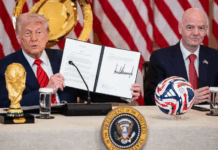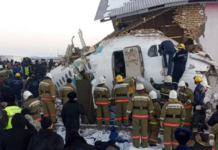
The European Commission has urged countries across the bloc to cut their gas use by 15% from August to March amid fears Russia could halt supplies.
It says the target is voluntary but will become legally binding if Moscow turns off the taps this summer.
The key Nord Stream 1 pipeline from Russia to Germany has been offline for maintenance for 10 days and is due to be turned back on this Thursday.
But there are concerns Moscow will not follow through on its promise.
Adding to the uncertainty, Vladimir Putin said on Wednesday that it was not clear whether or in what condition a turbine from the pipeline would be returned in after repairs in Canada.
The Russian president said there was a risk the equipment would have to be switched off at “some point” and Nord Stream 1 would be shut down.
Russia supplied Europe with 40% of its natural gas last year, with Germany the continent’s largest importer in 2020, followed by Italy.
European Commission President Ursula von der Leyen said a Europe-wide cut-off was now a “likely scenario”.
“Russia is blackmailing us. Russia is using energy as a weapon,” she said. “Therefore, in any event, whether it’s a partial, major cut-off of Russian gas or a total cut-off of Russian gas, Europe needs to be ready.”
Since Russia invaded Ukraine it has cut supplies to a number of countries which have rejected its demand for payment for gas in roubles, including Poland, Bulgaria, the Netherlands, Denmark and Finland.
It has also been accused of reducing supplies to make it more difficult for EU countries to build up reserves ahead of winter.
The UK gets less than 5% of its gas from Russia, but its gas prices are affected by fluctuations in global markets.
The Commission said a full cut-off during winter could have a major impact on EU economies, reducing growth by up to 1.5%.
The International Monetary Fund last week warned it could plunge countries into recession, heightening an energy crisis that has sent consumer bills soaring.
European nations have been trying to build up gas storage ahead of winter in case Moscow further restricts supplies.
The proposed 15% reduction is compared with average consumption in the same period from 2016 to 2021.
The gas that is saved would be put into storage, Ms von der Leyen tweeted.
“This is a big ask for the whole of the EU – but it is necessary to protect us,” she said.
She said that some member states are “more vulnerable” to gas supply disruption, and that EU states “all need to be ready to share gas”.
The plan has hit resistance from Poland, which has filled its gas storage to 98% of capacity and does not feel the need to cut its use.
Other countries have less stored – Hungary, for example, is at 47% of capacity.
The European Commission suggested measures governments could take to cut gas use, including compensating industries that use less and limiting heating and cooling temperatures in public buildings.
Governments should also decide the order in which they would force industries to shut down in the event of a supply emergency.
Households are classed as “protected consumers” under EU rules and would be shielded from such curbs.
EU member states will vote on the Council’s rationing plan at a meeting of energy ministers on 26 July.
Germany has already been taking steps towards gas rationing. In June the country triggered the “alarm” stage of an emergency gas plan to deal with shortages.
On Monday the International Energy Agency (IEA) called on European countries to further reduce gas consumption, saying Russia’s latest moves to restrict gas flows, along with other supply disruptions, are a “red alert” to the EU.
Fatih Birol, executive director of the IEA, said that despite efforts to reduce reliance on Russian gas, it hasn’t been enough to prevent Europe “finding itself in an incredibly precarious position today”, adding that the next few months were “critical”.






